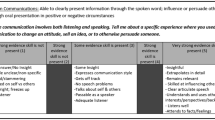Abstract
Although some researchers have attempted to define genetic counseling practice goals, no study has obtained consensus about the goals from a large sample of genetic counselors. The Reciprocal-Engagement Model (REM; McCarthy Veach, Bartels & LeRoy, 2007) articulates 17 goals of genetic counseling practice. The present study investigated whether these goals could be generalized as a model of practice, as determined by a larger group of clinical genetic counselors. Accordingly, 194 genetic counselors were surveyed regarding their opinions about the importance of each goal and their perceptions of how frequently they achieve each goal. Mean importance ratings suggest they viewed every goal as important. Factor analysis of the 17 goals yielded four factors: Understanding and Appreciation, Support and Guidance, Facilitative Decision-Making, and Patient-Centered Education. Patient-Centered Education and Facilitative Decision-Making goals received the highest mean importance ratings. Mean frequency ratings were consistently lower than importance ratings, suggesting genetic counseling goals may be difficult to achieve and/or not applicable in all situations. A number of respondents provided comments about the REM goals that offer insight into factors related to implementing the goals in clinical practice. This study presents preliminary evidence concerning the validity of the goals component of the REM.
Similar content being viewed by others
References
Bartels, D. M., LeRoy, B. S., McCarthy, P., & Caplan, A. L. (1997). Nondirectiveness in genetic counseling: A survey of practitioners. American Journal of Medical Genetics, 72, 172–179.
Bernhardt, B. A., Biesecker, B. B., & Mastromarino, C. L. (2000). Goals, Benefits, and Outcomes of Genetic Counseling: Client and Genetic Counselor Assessment. American Journal of Medical Genetics, 94, 189–197.
Biesecker, B. B. (2001). Goals of genetic counseling. Clinical Genetics, 60, 323–330.
Borders, L. D., Eubanks, S., & Callanan, N. (2006). Supervision of psychosocial skills in genetic counseling. Journal of Genetic Counseling, 15, 211–223.
Butow, P. N., & Lobb, E. A. (2004). Analyzing the process and content of genetic counseling in familial breast cancer consultations. Journal of Genetic Counseling, 13, 403–424.
Fraser, F. C. (1974). Genetic counseling. American Journal of Human Genetics, 26, 636–659.
Kessler, S. (1997). Psychological aspects of genetic counseling. IX. Teaching and counseling. Journal of Genetic Counseling, 6, 287–295.
Lobb, E., Butow, P., Meiser, B., Tucker, K., & Barratt, D. M. (2001). How do geneticists and genetic counselors counsel women from high-risk breast cancer families? Journal of Genetic Counseling, 10, 185–199.
McCarthy Veach, P., Bartels, D. M., & LeRoy, B. S. (2007). Coming full circle: A Reciprocal Engagement Model of genetic counseling practice. Journal of Genetic Counseling, 16, 713–728.
Resta, R., Biesecker, B. B., Bennett, R. L., Blum, S., Hahn, S. E., Strecker, M. N., et al. (2006). A new definition of genetic counseling: National Society of Genetic Counselors’ task force report. Journal of Genetic Counseling, 15, 77–83.
Silverman, D. (1993). Interpreting qualitative data: Methods for analyzing talk, text and interaction. London: Sage.
Smith, M., Freivogel, M.E., & Parrott, S. (2009). National Society of Genetic Counselors, Inc. Professional Status Survey 2008. Accessed from www.nsgc.org, April 14, 2009.
Wang, C., Gonzalez, R., & Merajver, S. D. (2004). Assessment of genetic testing and related counseling services: Current research and future directions. Social Science and Medicine, 58, 1427–1442.
Weil, J., Ormond, K., Peters, J., Peters, K., Biesecker, B. B., & LeRoy, B. (2006). The relationship of nondirectiveness to genetic counseling: Report of a workshop at the 2003 NSGC Annual Education Conference. Journal of Genetic Counseling, 15, 85–93.
Acknowledgements
This study was done in partial fulfillment of the requirements for the first author’s Master of Science degree from the University of Minnesota. We would like to express our sincere appreciation to the genetic counselors who completed the online survey. Dr. Christina Palmer served as Action Editor on the manuscript review process and publication decision.
Author information
Authors and Affiliations
Corresponding author
Rights and permissions
About this article
Cite this article
Hartmann, J.E., Veach, P.M., MacFarlane, I.M. et al. Genetic Counselor Perceptions of Genetic Counseling Session Goals: A Validation Study of the Reciprocal-Engagement Model. J Genet Counsel 24, 225–237 (2015). https://doi.org/10.1007/s10897-013-9647-6
Received:
Accepted:
Published:
Issue Date:
DOI: https://doi.org/10.1007/s10897-013-9647-6




